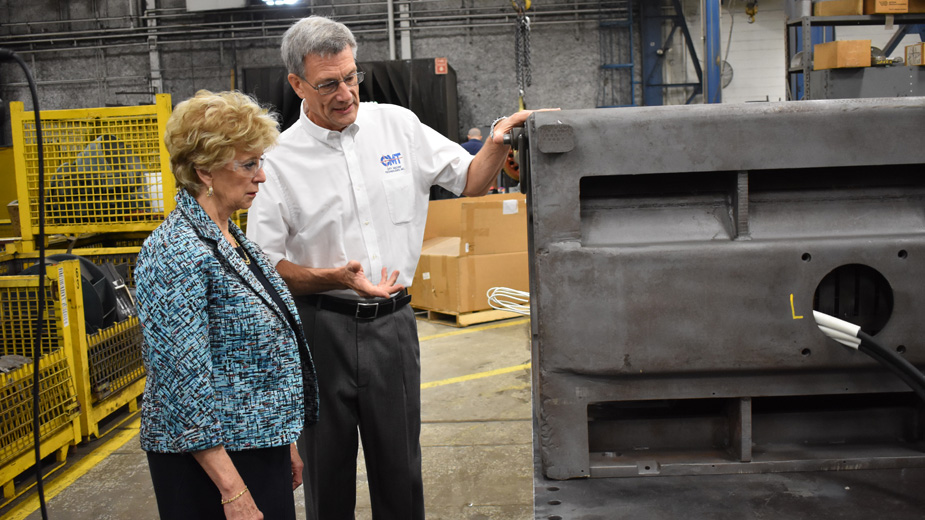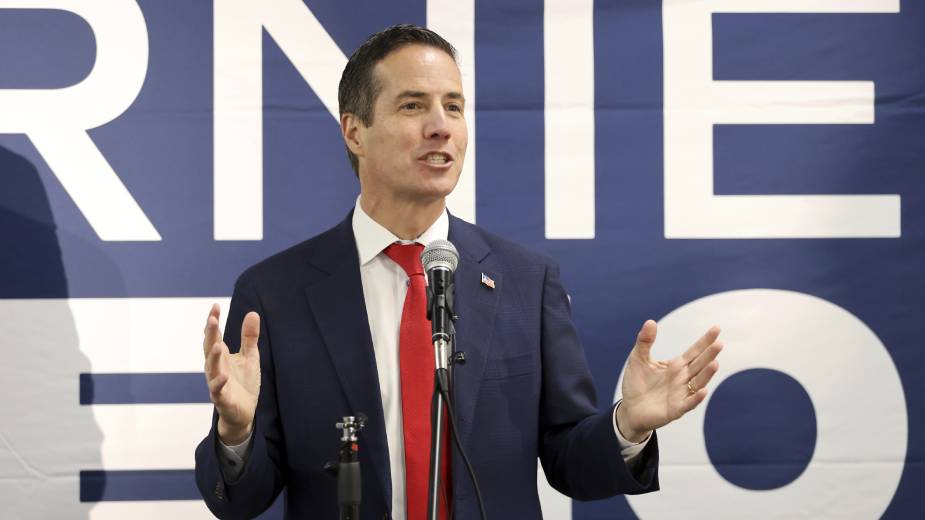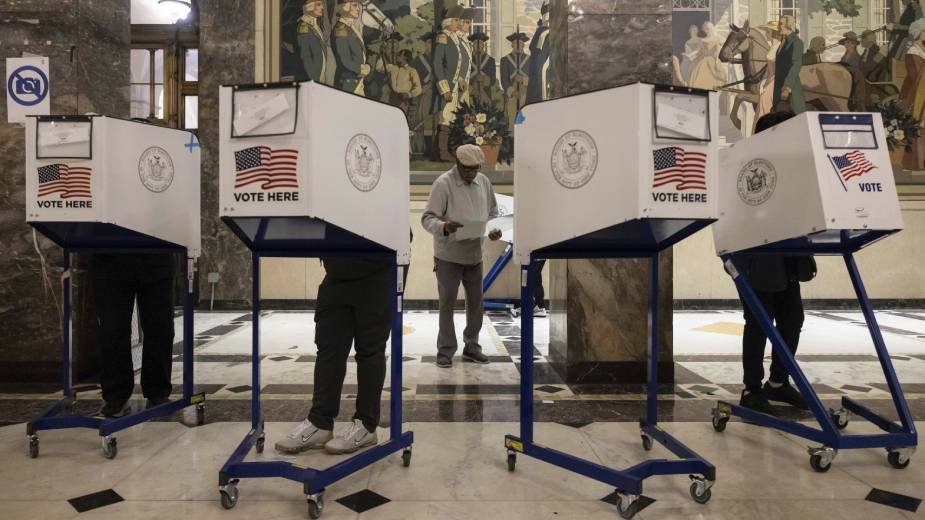McMahon Touts Trump Administration’s Small Business Policies
YOUNGSTOWN, Ohio — The U.S. Small Business Administration was instrumental in the success City Machine Technologies. On Thursday, the federal agency’s administrator got to see the fruits of the investments the SBA made some 30 years earlier.
Linda McMahon, co-founder and former CEO of World Wrestling Entertainment Inc. who President Donald Trump tapped last year to become SBA administrator, visited CMT’s Martin Luther King Jr. Boulevard plant following her keynote address at the Youngstown/Warren Regional Chamber’s “Salute to Business” breakfast.
Mike Kovach launched the company in August 1985 with SBA-supported financing from the Dollar Savings and Trust Co. and received SBA-backed loans for subsequent expansions, Kovach recalled Thursday morning. The industrial machine shop, which today has 65 employees, provides electrical, mechanical, machining and field services to industrial and commercial companies throughout the United States.
“This is a wonderful organization. It’s run by a family who really appreciates the work that their folks are doing,” McMahon said. “I’m very happy to know that SBA before my time was very instrumental in some of the loans that helped this business grow.”
Kovach and McMahon met last month at the Made in America Product Showcase held at the White House. CMT represented Ohio at the showcase of manufacturers from the 50 states. Since McMahon was going to be in the area for the chamber event, Kovach, CEO of CMT, invited her to see his company.
“Without the SBA’s help, I would not be here today, nor showcasing our products on the south lawn of the White House,” Kovach said.
“We at SBA like to say that we power the American dream, and you and your firm certainly are living proof of that,” McMahon said.
In her speech at the chamber breakfast and during her visit to CMT, McMahon touted the Trump administration’s efforts on behalf of small business. She cited surveys by the U.S. Chamber of Commerce and the National Association of Manufacturers reflecting “near record levels of optimism.”
From her perspective as SBA administrator, there is “no better signal of small business optimism” than entrepreneurs being willing to take a risk by seeking funds or counseling to start a business.
Since Trump took office, SBA has provided loan guarantees totaling $4.48 billion, supporting nearly 1.1 billion jobs, she reported. “It’s really great that we have a president who understands business and who is so supportive of small businesses all around the country,” she said.
CMT’s business has grown “exponentially” over the past 18 months as its customers are “doing extremely well,” Kovach affirmedf. He attributed the positive business environment to “having a businessman in the White House.”
Likewise, the SBA administrator ascribed the optimism of small-business owners to what they see in Washington, as the president delivers on his promises of regulatory reform, cutting taxes and workforce development.
Entrepreneurs often say it’s not a specific regulation but “the shear volume of rules and mandates” that choke their businesses, she said. “Most small businesses don’t have teams of lawyers or a compliance officer on staff.” The cost of complying with regulations to a small business is $11,700 per employee, she said.
The main complaint from businesses, especially manufacturers, is they find themselves out of compliance because they aren’t aware of the regulation in question.
“I’m all for the right kind of regulation. We clearly need regulation to run things safely and to do the things that we need to have oversight for,” McMahon said.
Reducing regulations is “big” for small businesses, Kovach said, although he acknowledged CMT hasn’t been exposed much to having to deal with “frivolous” ones. Interactions with environmental and health and safety agencies have been very professional, he said.
McMahon also praised Trump for signing a bill that rolled back some of the provisions of the Dodd–Frank Wall Street Reform and Consumer Protection Act of 2010, which was enacted in the wake of the financial crisis that precipitated the Great Recession.
The legislation relieves small and community financial institutions from what she called “overly burdensome regulations” and from annual oversight measures that include stress tests and other compliance measures.
“This will make it easier for community banks and credit unions to lend money and give access to capital,” she said. “Access to capital is key. It is a key factor in whether small businesses can succeed or fail.”
Businesses also are benefiting from the Tax Cuts and Jobs Act of 2017, and are giving raises and bonuses, hiring more workers and investing in equipment, she said. The SBA administrator cited an employer she visited in Jacksonville, Fla., who credited the tax cut with his ability to purchase a new $80,000 truck.
“He said the tax cuts were the motivation he needed,” she said.
McMahon acknowledged some small businesses are feeling the effects of the tariffs the administration has imposed on products from other countries, and the tariffs imposed by those nations on U.S. goods.
Still, executives she has spoken with continue to be supportive of the president’s policies and are willing to accept what they hope will be short-term pain “because they believe that in the end we’re going to right the wrong of the upside-down trade imbalance that we’ve had,” she said.
As a result of the growth spurred by reduced regulation and the tax cuts, many businesses are having trouble finding workers with the skills they need, particularly people who work with their hands. That’s why President Trump has made workforce development a priority, McMahon said.
In July, Trump signed an executive order establishing the President’s National Council for the American Worker, which McMahon said aims to create an integrated strategy to bring together employers, educational institutions and unions to develop apprenticeship programs and curricula to provide students with the skills that employers need,.
“Simply put, we need a workforce that is ready to work,” she remarked.
The skills gap isn’t the only issue facing employers looking to hire. Kovach reported that the failure rate for applicants taking a drug test is higher than 50%. And those are the ones who choose to proceed after being advised that a drug test is required – many are scared away when told they have to take a drug test.
White House adviser Kellyanne Conway has taken point on the administration’s approach to the opioid issue, McMahon said. Doctors and hospitals are prescribing fewer opioids for pain, but work on aspects such as the education component and understanding opioids’ negative impacts is continuing.
“We’ve got a lot of work to do in that department,” McMahon conceded.
Kovach said he could hire another 20 people if he could find enough qualified employees who could pass a drug test.
“We are a drug-free workplace. We have to be,” he said. “We go into nuclear plants, power plants, steel mills.”
Businesses point not only to the lack of job candidates with industry-specific skills but also the lack of so-called soft skills. “They’ll talk about people who come in who don’t know how to look you in the eye or shake your hand or proper etiquette,” McMahon said.
Pictured: Mike Kovach, CEO of City Machine Technologies, shows SBA Administrator Linda McMahon one of the huge industrial magnets produced at his factory in Youngstown.
VIDEO: ‘3 Minutes With’ SBA Administrator Linda McMahon
Copyright 2024 The Business Journal, Youngstown, Ohio.



